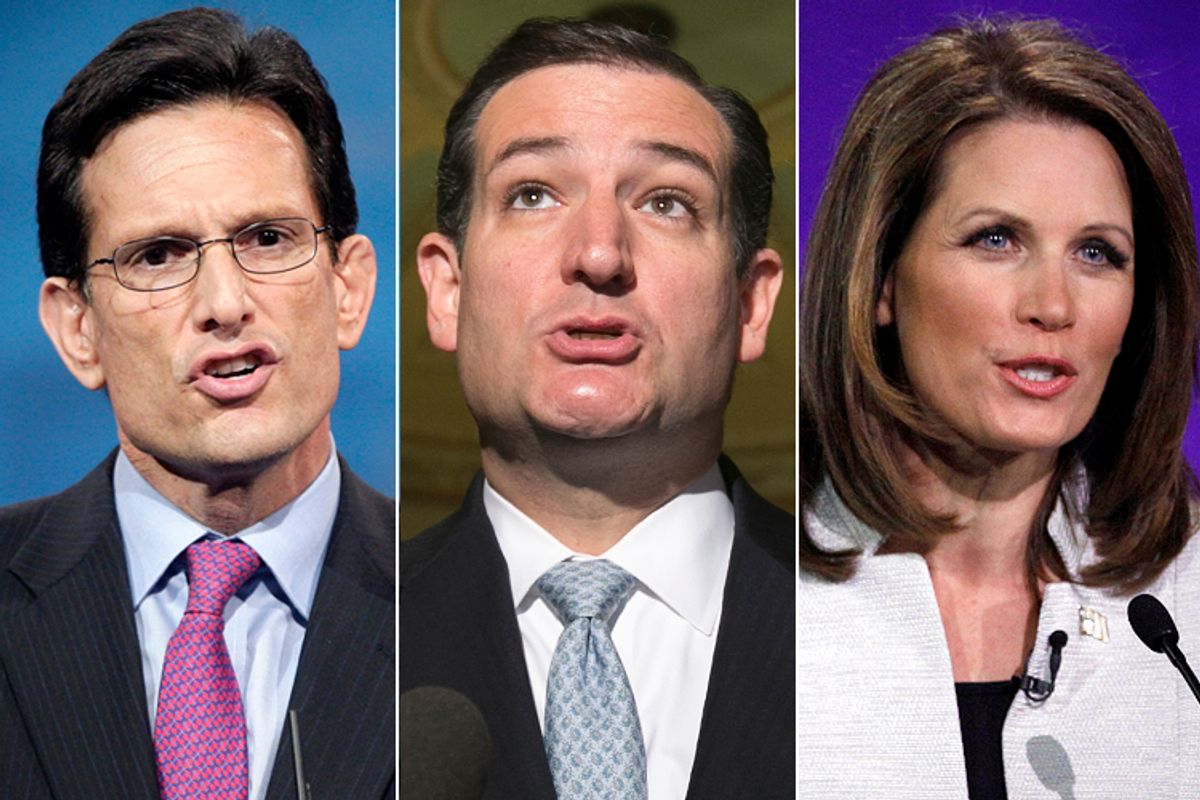After 2013 came to an end, and Obamacare enrollees became Obamacare beneficiaries, Republicans began pegging all of their hopes on the possibility that Obamacare's botched rollout would ultimately prove unrecoverable. Repeal had just become synonymous with rescinding insurance benefits, so that option was at last really, truly out. Replace isn't happening in today's policy-phobic GOP. So the right's last best hope is that the law will collapse on its own, or perhaps with the help of an ongoing campaign to discourage enrollment. Obamacare is designed to absorb certain shocks, but maybe the October and November blows will prove in hindsight to have been too devastating for the system to withstand.
New data from the Department of Health and Human Services, industry testimonials, and other recent developments suggest that wish, too, is dead, and that all of the right's efforts to undermine the law are now wholly gratuitous. The Affordable Care Act isn't going to collapse no matter what conservatives do.
You wouldn't know that from listening to Republicans this week.
After establishing a new convention of Obamacare enrollment unskewing at the beginning of the year, and then retreating from Obamacare spin for a few days, Affordable Care Act opponents have returned with a vengeance to argue that new data from the Department of Health and Human Services is a harbinger of doom for the law.
For the first time since the open-enrollment period began in October 2013, HHS officials provided reporters with information about the demographic composition of enrollees through December, and the short version of the story is that if the enrollment period were to end right now, beneficiaries in states across the country would be significantly older (and, thus, likely less healthy) than the administration initially believed they ultimately needed to be to steady or reduce premiums.
Like campaign operatives celebrating polls a year out from an election, Republicans haven't been able to resist the urge to spin the numbers as if they're proxies for final 2014 enrollment figures. But unlike polling data, which bounces around unpredictably over the course of a campaign, enrollment in a program like Obamacare tends to follow a predictable pattern -- and HHS data actually suggests conservatives have already lost.
Of the nearly 2.2 million applicants who enrolled before Jan. 1, 30 percent are under the age of 35 and 24 percent are in the crucial 18-34-year-old age band. These percentages are lower in some states than others, which means some marketplaces face a heavier lift if they hope young people ultimately compose 38 percent of their risk pools by the end of March. And basically marketplaces will be trying to make up some ground in the next two and a half months.
But they almost certainly will. And even if they don't -- even if 2014 enrollees look exactly like 2013 enrollees -- the pools are probably already diverse enough to preclude the premium spike, and death spiral, conservatives are hoping for. "Overall costs in individual market plans would be about 2.4 percent higher than premium revenues," according to the a Kaiser Family Foundation analysis, which would normally augur for a small increase in premiums -- except the law includes backstops to cover a modest shortfall like that.
In other words, nationwide premiums probably aren't going up at all next year, and might even drop if young people flood the program in the closing weeks of enrollment.
That's exactly what experts predict will happen, based largely on Massachusetts' own healthcare reform experience -- which, of course, doesn't account for the White House's unparalleled ability to move message. After everything that happened in October and November, and missteps that continue to this day, it makes sense for both allies and opponents to doubt that the administration and its allies can execute the rest of the rollout flawlessly. But the one thing they're most likely to get right is targeted outreach.
Those efforts are just ramping up now, delayed by Healthcare.gov's two month failure.
Compare current enrollment figures from Healthcare.gov and non-Healthcare.gov states, and it's clear that the website failure has artificially depressed signups. Healthcare.gov's December enrollment surge didn't make up for all of that lost time, but the surge itself indicates the effective outage didn't undermine demand for insurance. Taken together it stands to reason the administration and reform allies won't have a hard time reaching willing consumers, and that those customers will be overrepresented by younger people.
They might still fall short of their goals, but not nearly far enough to threaten the integrity of the system. If Obamacare faced the real threat of collapse, insurers would probably be panicked. But at an industry conference in San Francisco on Tuesday, executives were cautiously optimistic about enrollment totals and composition, and much more optimistic that the exchanges are real growth opportunities and will be functioning profit centers in the years ahead.
Obviously Republicans aren't going to give up campaigning on Obamacare failures unless and until they can no longer derive any political advantage from it. Given the right's fanaticism about the law they might keep it up for longer than that. But at this point their parallel efforts to curb enrollment stand only to harm the people who listen to them and take them seriously.
Update: The industry conference referenced in the article is taking place in San Francisco, not New York. We regret the error.



Shares